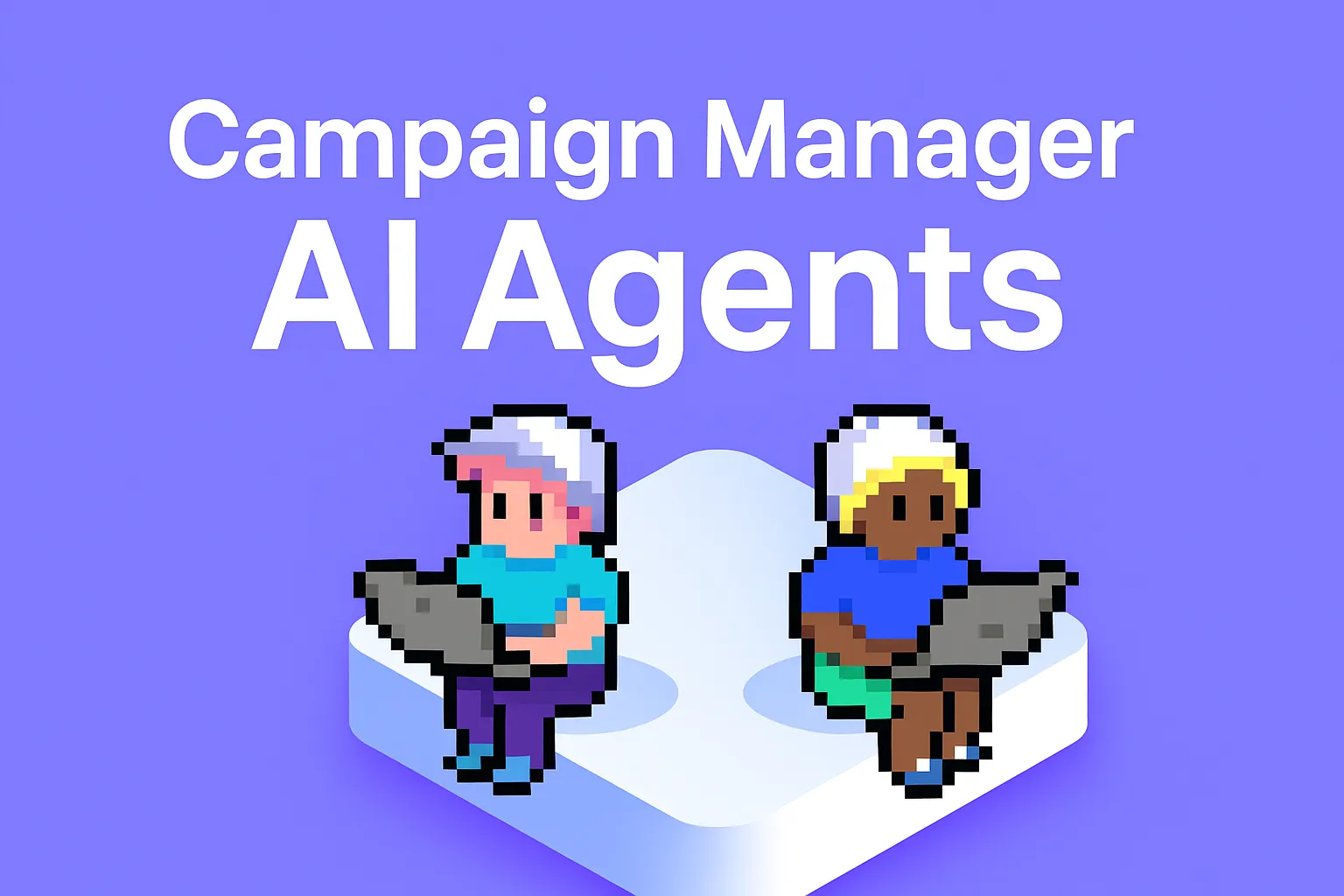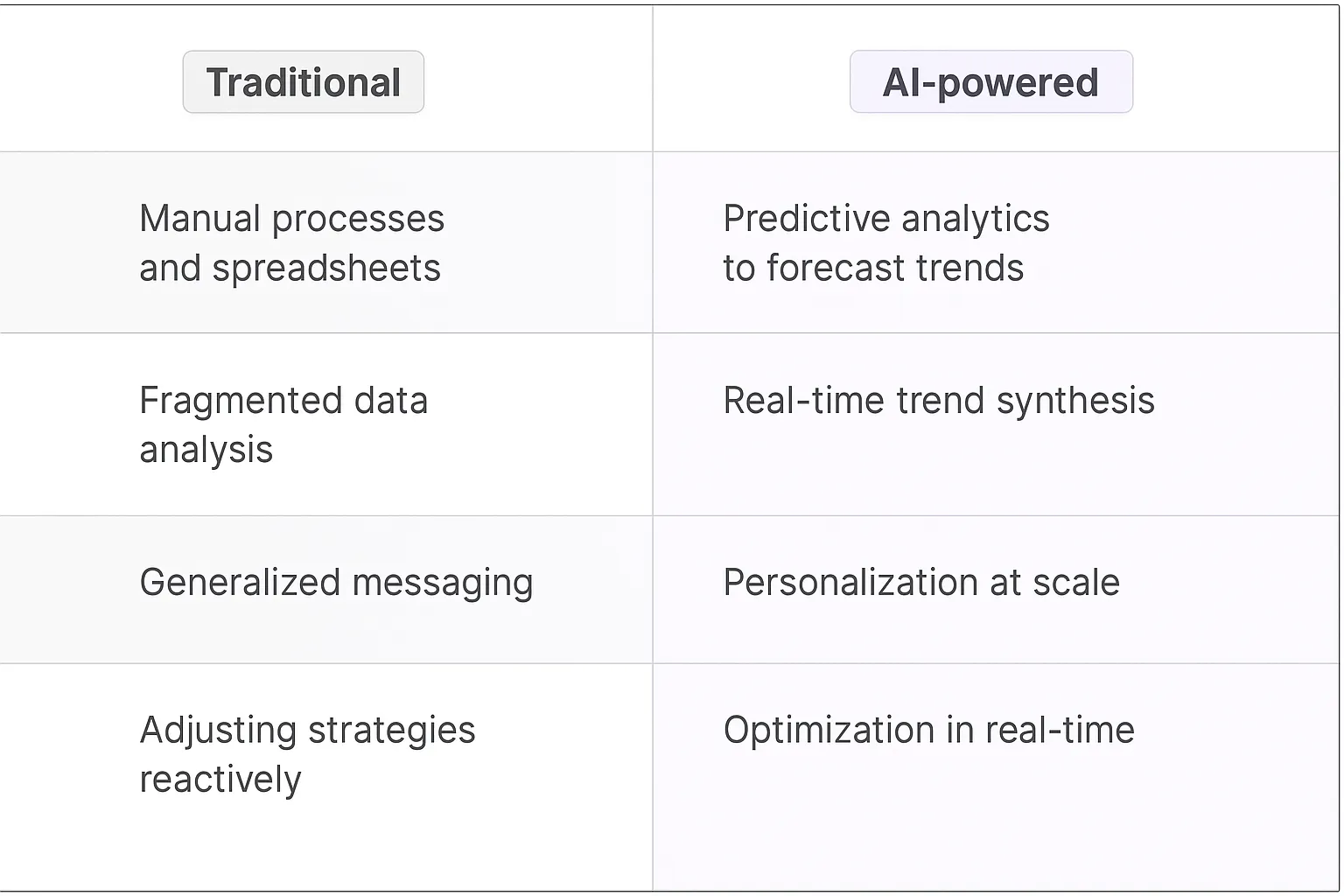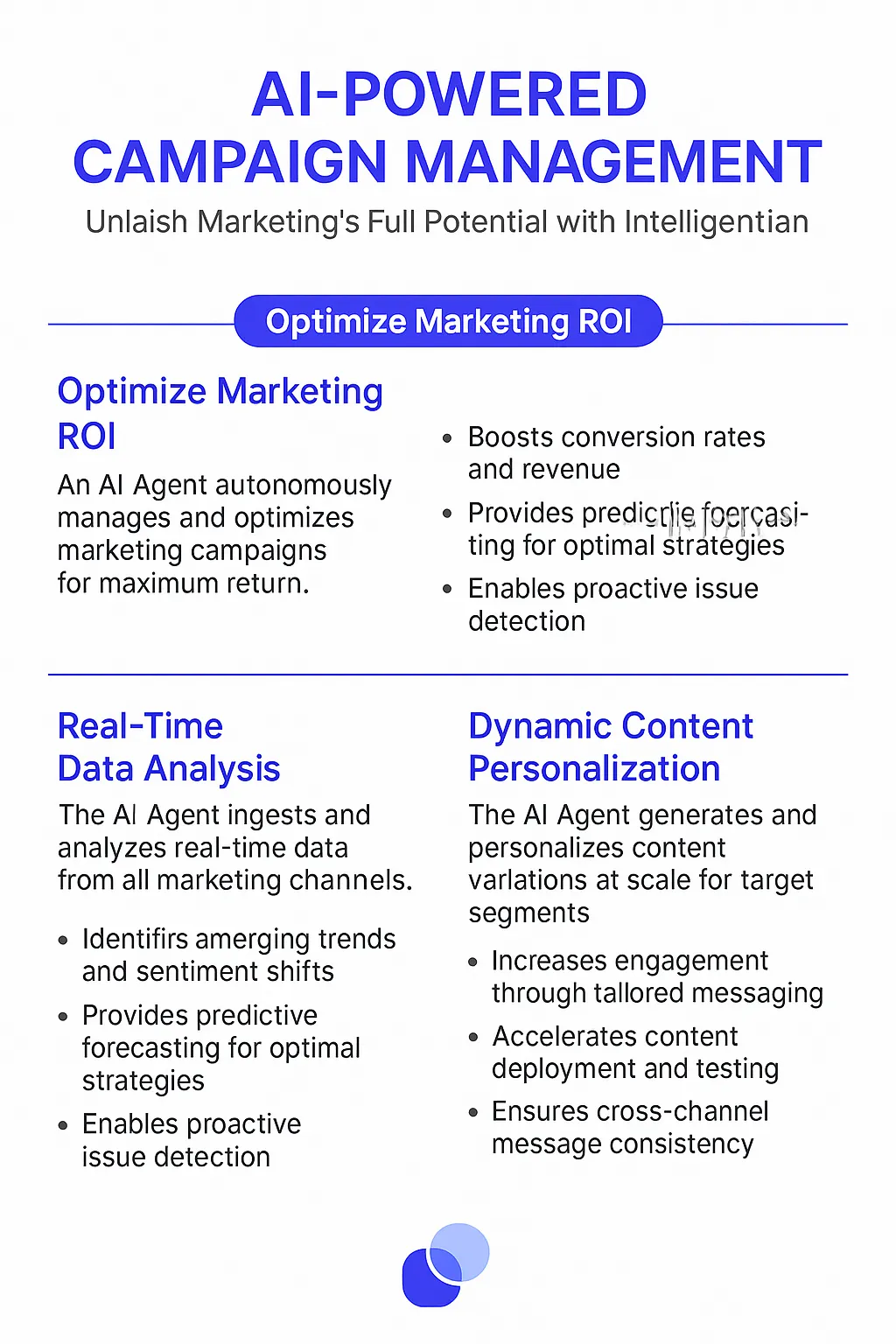Campaign Manager is a sophisticated marketing tool that's getting a major upgrade with AI. It's not just a platform for running ads or scheduling social media posts anymore. With AI integration, it's evolving into a predictive powerhouse that can analyze vast amounts of data, spot trends before they happen, and make real-time adjustments to maximize campaign performance. Think of it as your marketing command center, but with a built-in data scientist and strategist working 24/7.
The AI-enhanced Campaign Manager is packed with features that are changing the game:1. Predictive Analytics: It doesn't just show you what happened; it tells you what's likely to happen next.2. Hyper-Personalization: It crafts individualized messages at scale, making each customer feel like they're getting VIP treatment.3. Real-Time Optimization: Constantly tweaks and adjusts campaigns based on performance data, ensuring you're always putting your best foot forward.4. Cross-Channel Coordination: Seamlessly manages campaigns across multiple platforms, creating a cohesive brand experience.5. Automated A/B Testing: Runs complex multivariate tests across channels, learning and adapting faster than any human team could.These features aren't just bells and whistles. They're the engines driving a new era of marketing efficiency and effectiveness.

Before AI agents entered the scene, campaign managers relied on a hodgepodge of tools and manual processes. They'd juggle spreadsheets, CRM systems, and analytics platforms, trying to piece together insights from fragmented data. It was like trying to solve a Rubik's Cube blindfolded – possible, but painfully inefficient.
Teams would spend countless hours sifting through data, crafting messages, and adjusting strategies based on gut feelings rather than real-time insights. The result? Campaigns that were often reactive rather than proactive, missing key opportunities to engage audiences effectively.
Enter AI agents – the game-changers in the campaign management arena. These digital teammates are like having a team of data scientists, copywriters, and strategists working 24/7, but without the need for coffee breaks or sleep.
First off, AI agents bring predictive analytics to a whole new level. They're not just looking at historical data; they're processing real-time information to forecast trends before they happen. This means campaign managers can pivot strategies on the fly, capitalizing on emerging opportunities or mitigating potential risks before they materialize.
Personalization at scale becomes a reality with AI agents. They can analyze individual user behaviors and preferences, crafting tailored messages that resonate on a personal level. It's like having a conversation with millions of people simultaneously, each feeling like it's one-on-one.
AI agents also excel at content optimization. They can A/B test hundreds of variations in real-time, learning and adapting faster than any human team could. This continuous optimization loop means campaigns are always improving, always learning, always getting better ROI.
Perhaps most importantly, AI agents free up human creativity. By handling the data-heavy lifting and routine tasks, they allow campaign managers to focus on high-level strategy and creative thinking. It's not about replacing humans; it's about augmenting their capabilities and letting them shine where they're most valuable.
In essence, AI agents in campaign management are like having a crystal ball, a personalization engine, and a tireless optimization machine all rolled into one. They're not just improving campaigns; they're fundamentally changing how we think about audience engagement and marketing strategy.

AI agents are reshaping the landscape of campaign management, bringing a level of sophistication and efficiency that's hard to ignore. These digital teammates are not just tools; they're becoming integral parts of marketing teams, handling complex processes with ease.
One standout process is audience segmentation. AI agents can dive deep into vast pools of customer data, identifying patterns and behaviors that humans might miss. They're not just sorting demographics; they're uncovering psychographic insights that can make or break a campaign. This granular segmentation allows for hyper-personalized messaging that resonates on a whole new level.
Another game-changing process is real-time campaign optimization. AI agents are constantly monitoring performance metrics, making micro-adjustments to ad placements, bid strategies, and creative elements. It's like having a seasoned marketer working 24/7, but at a scale and speed that's humanly impossible.
When it comes to specific tasks, AI agents are proving their worth in spades. Take content creation, for instance. These digital teammates can generate ad copy, email subject lines, and even social media posts that are not only on-brand but also optimized for engagement. They're not replacing human creativity; they're amplifying it, allowing marketers to focus on high-level strategy while the AI handles the grunt work.
A/B testing is another area where AI agents shine. They can set up, run, and analyze multivariate tests across different channels simultaneously. This isn't just about testing two versions of an email; we're talking about complex, multi-channel experiments that would take a human team weeks to execute and analyze.
Budget allocation is yet another task where AI agents are making waves. They can analyze historical data, current market trends, and campaign performance in real-time to dynamically adjust budget allocation across channels. This ensures that every dollar is working as hard as possible, maximizing ROI in a way that manual management simply can't match.
The potential of AI agents in campaign management is vast and largely untapped. As these digital teammates become more sophisticated, we're likely to see a shift in how marketing teams operate. The future isn't about AI replacing humans; it's about creating a symbiotic relationship where both human creativity and machine efficiency combine to create campaigns that are more effective, more personalized, and more impactful than ever before.

AI agents are reshaping the landscape of campaign management across industries, and their impact is nothing short of transformative. These digital teammates are not just tools; they're becoming integral parts of marketing teams, bringing a level of precision and adaptability that's changing the game. Let's dive into some concrete examples of how different sectors are leveraging AI in their campaign strategies.
From e-commerce to politics, from non-profits to global brands, AI agents are proving their worth by tackling complex campaign challenges with finesse. They're crunching numbers, predicting trends, and personalizing content at a scale that would be impossible for human teams alone. But it's not about replacing human creativity—it's about amplifying it.
In the following sections, we'll explore how various industries are harnessing the power of AI to craft campaigns that resonate deeply with their audiences. We'll see how these digital teammates are helping marketers make data-driven decisions, optimize resource allocation, and create more engaging customer experiences. Get ready to see how AI is not just supporting campaigns, but elevating them to new heights of effectiveness and innovation.
The retail industry is ripe for disruption, and Campaign Manager AI Agents are poised to be the catalyst. These digital teammates are not just another tool in the marketer's arsenal; they're the secret weapon that will separate the winners from the losers in the next wave of retail innovation.
Let's break it down: Retail success hinges on understanding and predicting consumer behavior. Traditional methods rely on historical data and gut instinct. But Campaign Manager AI Agents? They're operating on a whole different level.
These AI-powered allies continuously analyze vast amounts of data - from social media trends to weather patterns to economic indicators. They're not just looking at what happened; they're anticipating what will happen. It's like having a crystal ball, but one that's powered by advanced machine learning algorithms.
Imagine a luxury fashion retailer. Their Campaign Manager AI Agent doesn't just schedule posts or send emails. It's crafting personalized, multi-channel experiences for each customer. It knows that Sarah, a high-value customer, tends to browse evening wear on rainy Sundays. So, it ensures she sees an ad for the latest cocktail dress collection right when she's most likely to be in a shopping mood.
But it doesn't stop there. The AI Agent is also optimizing inventory based on predicted demand, adjusting pricing in real-time to maximize profitability, and even suggesting new product lines based on emerging fashion trends it's detected.
This isn't just automation; it's amplification of human creativity and strategic thinking. The marketers aren't being replaced; they're being empowered to operate at a level of sophistication and scale that was previously unimaginable.
The retailers who embrace these AI Agents will create a flywheel effect. Better campaigns lead to more engaged customers, which leads to more data, which leads to even better campaigns. It's a virtuous cycle that will leave the competition in the dust.
In the world of retail, where margins are tight and competition is fierce, Campaign Manager AI Agents aren't just a nice-to-have. They're the difference between thriving and barely surviving. The future of retail belongs to those who can harness the power of AI to create truly personalized, predictive, and profitable customer experiences. And that future is already here.
The wealth management industry is on the cusp of a massive transformation, and Campaign Manager AI Agents are the key drivers. These digital teammates aren't just another fintech fad; they're the secret sauce that will separate the industry leaders from the laggards in the next wave of financial services innovation.
Here's the deal: Success in wealth management hinges on trust, personalization, and timely communication. Traditional methods rely on relationship managers juggling hundreds of clients, often leading to generic advice and missed opportunities. Campaign Manager AI Agents? They're operating in a whole new league.
These AI-powered allies continuously analyze a staggering amount of data - from market trends to individual client behaviors to global economic indicators. They're not just reacting to what's happening; they're anticipating market shifts and client needs before they even materialize. It's like having a team of expert analysts working 24/7 for each client, but powered by advanced machine learning algorithms.
Consider a high-net-worth individual named Alex. The Campaign Manager AI Agent doesn't just send quarterly portfolio updates. It's crafting a bespoke, multi-channel communication strategy tailored to Alex's unique financial goals, risk tolerance, and communication preferences. It knows that Alex tends to get anxious during market volatility and prefers video explanations over text. So, when there's a market dip, it automatically schedules a video call with Alex's advisor and prepares a personalized analysis of how the dip affects Alex's long-term strategy.
But it goes beyond just communication. The AI Agent is also identifying investment opportunities aligned with Alex's values, adjusting portfolio allocations based on predicted market trends, and even suggesting new services Alex might need as their life circumstances change.
This isn't about replacing human advisors; it's about amplifying their capabilities to superhuman levels. The wealth managers aren't being sidelined; they're being empowered to operate with a level of insight and personalization that was previously unthinkable at scale.
The firms that embrace these AI Agents will create a compounding advantage. Better engagement leads to deeper client relationships, which leads to more assets under management, which leads to more data, which leads to even better engagement. It's a virtuous cycle that will leave the competition scrambling to catch up.
In an industry where trust is everything and client expectations are sky-high, Campaign Manager AI Agents aren't a luxury. They're the difference between exponential growth and gradual obsolescence. The future of wealth management belongs to those who can harness AI to deliver truly personalized, proactive, and prescient financial guidance. And that future isn't some far-off concept - it's unfolding right now.
Implementing a Campaign Manager AI Agent isn't just about slapping some machine learning on your marketing stack and calling it a day. It's a complex beast that requires serious technical chops and a deep understanding of both AI and marketing dynamics.
First off, you're dealing with massive amounts of data from various sources - social media engagement, email open rates, website traffic, conversion funnels, and more. Your AI needs to ingest, process, and make sense of this data tsunami in real-time. It's like trying to drink from a fire hose while solving a Rubik's cube.
Then there's the challenge of creating algorithms that can actually make intelligent decisions based on this data. We're not talking about simple if-then statements here. Your AI needs to understand complex customer behaviors, predict trends, and optimize campaigns on the fly. It's like teaching a computer to think like Don Draper, but with more math and less whiskey.
Integration with existing marketing tools and platforms is another headache. Your AI agent needs to play nice with your CRM, email marketing software, ad platforms, and analytics tools. It's like trying to get a group of divas to perform a harmonious duet - possible, but requires some serious diplomatic skills.
On the operational side, implementing a Campaign Manager AI Agent is like introducing an alien species into your marketing ecosystem. It's going to shake things up, and not everyone's going to be thrilled about it.
First, there's the human factor. Your marketing team might view this AI as a threat to their jobs. You need to manage this perception carefully, positioning the AI as a tool to enhance their capabilities, not replace them. It's like convincing a chef that a new high-tech oven will make their food better, not take over their job.
Then there's the learning curve. Your team needs to understand how to work with this new AI teammate. It's not just about pressing a button and letting the AI do its thing. They need to know how to input the right data, interpret the AI's recommendations, and make strategic decisions based on its insights. It's like learning to drive a Formula 1 car when you've been used to a bicycle.
Data privacy and security is another can of worms. Your AI is handling sensitive customer data and making decisions that impact your brand. You need robust systems in place to ensure data protection and maintain ethical AI practices. One misstep here, and you're looking at a PR nightmare and potential legal issues.
Lastly, there's the challenge of measuring ROI. AI implementations aren't cheap, and you need to justify the investment. But how do you quantify the value of improved decision-making or more efficient campaign management? It's like trying to measure the ROI of a crystal ball - tricky, but not impossible if you set the right metrics from the start.
Campaign Manager AI Agents are ushering in a paradigm shift in marketing approaches. These AI systems amplify human creativity and strategy to unprecedented levels by handling data analysis, optimization, and personalization at scale. This allows marketers to focus on big-picture thinking and innovative campaigns.
The future of marketing lies in creating a symbiotic relationship where human ingenuity and machine efficiency combine to produce more effective, personalized, and impactful campaigns. Marketers who embrace this AI-augmented future will thrive in the evolving landscape, outpacing their competitors.
As we progress, the critical question is how quickly and effectively we can integrate AI into our marketing strategies. The AI revolution in marketing is already underway, with Campaign Manager AI Agents at the forefront. This exciting transformation promises to reshape the industry, making it imperative for marketers to adapt and harness the power of AI-driven campaign management.